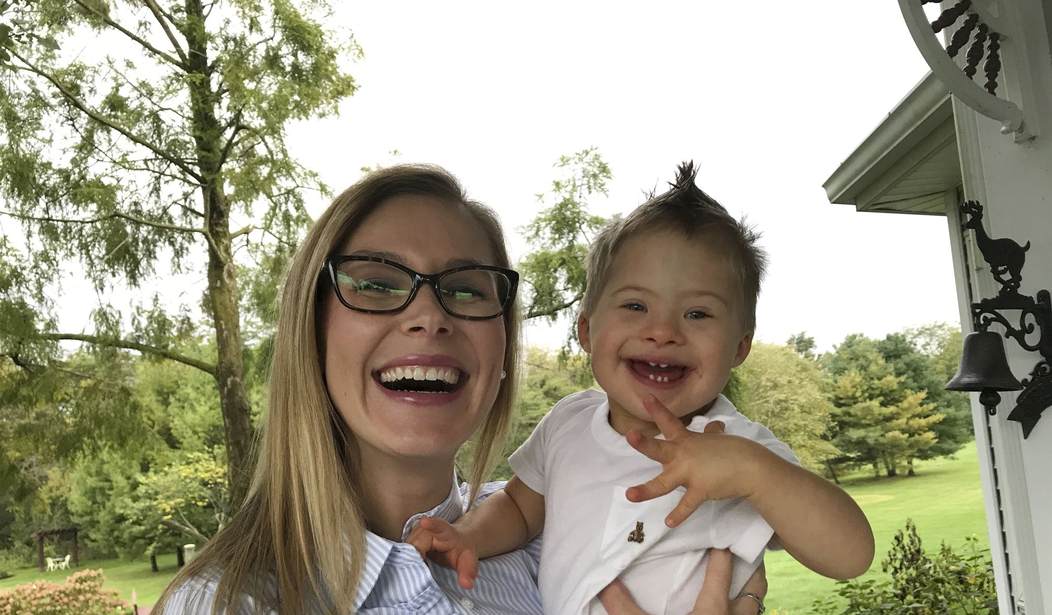It is said that the highest and most noble work in this life is that of a mother. This is especially true of mothers of children with special needs. As we celebrate Mother’s Day, my admiration goes out to those moms.
When I was expecting our second child, I received an urgent phone call from my obstetrician’s office after routine prenatal screening tests. The nurse was extremely anxious for me to come in right away for an amniocentesis. The doctor, painting a picture of doom and gloom, wanted to confirm a suspected Down Syndrome diagnosis for our unborn daughter.
It's not a call expectant parents plan for, and fewer still are prepared for. Thankfully, I grew up knowing people with Down Syndrome and had witnessed the joys of raising a child with that extra special 21st chromosome. I also knew amniocentesis is risky enough to cause miscarriage. Resisting the dour warnings from the grim doctor, I declined the additional test.
In my case, the initial screening had produced a false positive. (This is tragically common; a New York Times expose confirmed many screening tests are flat out wrong.) But this experience gave me an appreciation for the fear often peddled by the medical establishment. Fear of the unknown is powerful, and makes women susceptible to pressure to test and terminate.
Women are rarely offered information on the joys associated with raising a child with Down Syndrome, or the multitude of resources available to families. Sadly, up to 90% of women who face this prenatal diagnosis are pressured into the decision to abort.
Recommended
A powerful new report from Congress’ Joint Economic Committee examines this trend to selectively abort (potential) Down Syndrome babies. The report, led by Sen. Mike Lee (R-UT),concludes that people with Down Syndrome are “immeasurably valuable” and, like the rest of us, vary by education, aptitude, and job opportunities. It found that 99 percent of people with Down Syndrome are happy with their lives, and 97 percent like who they are. Try finding those levels of happiness in Americans in general. Parents and siblings are similarly positive about having someone with Down Syndrome in their life. The study noted, “99 percent of parents report they love their child with Down Syndrome, 97 percent are proud of them.”
These findings are not surprising to mothers of children with Down Syndrome, several of whom I surveyed for this article. One told me her son, Christopher, finds unbridled joy in the simplest things, “When I bring home books from the library, he acts like it’s Christmas. His joy in the little things helps us to find joy in the little things, too.” She describes his interpersonal skills as super-power-like, because of his special ability to draw people out of themselves.
Bosco, at age 5, reflects his mother’s artistic talent as he belts out every last word ofThe Beatles’ “I Want to Hold Your Hand” or Taylor Swift’s “Mr. Perfectly Fine.”He imitates his father’s competitive spirit and is everyone’s favorite fan his brothers’ soccer games. Boscogives a charming hello to strangers he passes, leaving them with unexpected joy. To people he knows well, he is known to gently take their face in his little hands, look them in the eye, and say “I love you.”
Another mom tells me that after having several boys, she prayed for a “perfect girl.” They got Grace, the precious girl their imperfect family needed the most. Grace teaches her brothers not to judge people superficially, but to see with eyes of the heart.
Luke’s mother describes his unsurpassed sense of humor. All the siblings want Luke to live with them when he is older -- and they playfully threaten to fight to get him.
Little Gabriel is described by his mom as a boy who lights up every room. Since it takes him longer to process things, “he teaches us to slow down and savor every moment.”
Sonia McGarrity is the remarkable mother of four children with Down Syndrome, three of whom are adopted. Sonia sometimes feels overwhelmed, but says of her family, “We are surrounded by love and opportunities to love.” According to the National Down Syndrome Adoption Network, there is a waiting list of families like the McGarrity’s who are hoping to adopt a special needs baby.
When pressed to share the challenges of raising a special needs child, these moms noted the messy and prolonged adventure of potty training, feeling pulled in many directions, and the vigilance required to manage related health problems. One mom summarized it this way, “After the initial shock and worry, I can’t believe how thankful I am. If only people knew the gift they were being given!”
So, to all the mothers of extra special kids, Happy Mother’s Day! Your generosity is inspiring.

























Join the conversation as a VIP Member